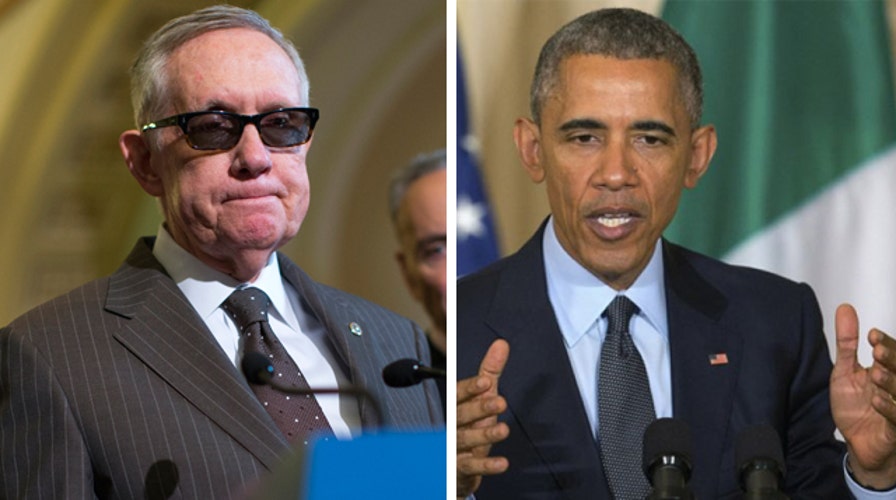Democrats divided over multi-nation trade deal
Concerns over deal's impact on U.S. jobs causing friction among Democrats
President Obama is facing a Democratic revolt over ambitious trade initiatives that are dividing the party, leading to tensions with everyone from Senate party leader Harry Reid to liberal icon Elizabeth Warren.
The disagreements erupted on Wednesday as leaders of the Senate Finance Committee tried to proceed with a vote on trade legislation, but liberal opposition quickly delayed the process.
Sen. Bernie Sanders, I-Vt., a fierce opponent of the trade push, invoked a Senate scheduling rule to sideline the committee's actions for hours. "This job-killing trade deal has been negotiated in secret," said Sanders, who made a lengthy Senate speech denouncing the legislation.
Senate Finance Committee Chairman Orrin Hatch, R-Utah, vowed the committee would finish the bill Wednesday. "I don't care how much time it takes," he said.
The flare-up was just one of many in the Democratic ranks. In a blunt challenge to the president, Reid told reporters earlier this week: "I'm not only no, I'm hell no" on Obama's proposal.
The Senate Finance Committee eventually endorsed Obama's request for "fast track" legislation late Wednesday, which would renew presidential authority to present trade deals that Congress can endorse or reject but not amend. The committee voted 20-6 to pass the fast track bill. The only committee Republican voting no was Sen. Richard Burr of North Carolina.
If the House and Senate eventually comply, the legislation would ease the way for sweeping trade deals. Obama wants "fast-track" powers to help move free-trade proposals such as the 12-nation Trans-Pacific Partnership.
This, in turn, would make it easier to approve deals like the controversial TPP.
But that authority, and those proposals, face resistance from labor unions and liberal groups who say free-trade pacts hurts U.S. jobs.
They lost a round Wednesday. The Finance Committee narrowly defeated a "currency manipulation" measure that Obama aides said would unravel the Pacific Rim deal. Votes for and against the provision were about evenly divided between Republicans and Democrats, highlighting the unusual -- and possibly tenuous -- political alignments on trade.
The push-back now has Obama on defense, as he tries to muster a bipartisan coalition.
"I would not be doing this trade deal if I did not think it was good for the middle class," Obama said in an interview Tuesday with MSNBC. "When you hear folks make a lot of suggestions about how bad this trade deal is, when you dig into the facts, they are wrong."
In the interview, Obama specifically called out deal critic Elizabeth Warren, a Massachusetts Democratic senator and hero of liberal groups.
"I love Elizabeth. We're allies on a whole host of issues. But she's wrong on this," Obama said.
Few issues divide Democrats more than trade. Obama, like former President Bill Clinton, supports free trade, but many Democratic lawmakers do not.
Clinton's and Obama's stands -- and liberal groups' opposition -- pose a dilemma for Hillary Clinton, the former first lady now seeking the presidency herself. Campaigning Tuesday in New Hampshire, she declined to say whether she supports the Pacific-rim proposal.
"We need to build things, too," Clinton said, taking a pro-manufacturing stance generally embraced by both parties. "We have to do our part in making sure we have the capabilities and skills to be competitive," she said, while getting back to "a much more focused effort, in my opinion, to try to produce those capacities here at home."
This week, Senate Majority Whip John Cornyn, R-Texas, called the trade deal "fragile," noting that Democratic support is necessary. Republican sources say Obama needs to impress his desire for this trade pact on his Democratic allies.
Amid the divisions in Democratic ranks, Fox News has learned there is an effort afoot among congressional Democrats to court just enough from their side not to embarrass the president.
But Senate Finance Committee member Chuck Schumer, D-N.Y., says the administration must press China to stop manipulating its currency, even though China isn't a party to the Pacific-rim negotiations. "I'm disappointed in the efforts by President Obama," Schumer said at a committee hearing Tuesday.
If a nation keeps its currency value artificially low, it can boost exports by making local products more affordable to foreigners. Economists disagree on whether China still engages in the practice, and the Obama administration says it addresses currency manipulation in the fast-track bill.
Republicans generally support trade pacts. But Obama can't count on them alone to push the fiercely debated bills through the GOP-controlled House and Senate.
Most or all Finance Committee Republicans support fast track. Democratic supporters include Sens. Ron Wyden of Oregon, Maria Cantwell of Washington, Tom Carper of Delaware and Mark Warner of Virginia.
Committee passage would move the bill to the full Senate. The House has yet to vote on fast track this year.
Fox News' Chad Pergram and The Associated Press contributed to this report.





